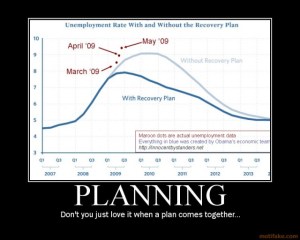“I spent hours meticulously drawing an old castle, three levels of floor plans and carefully populating every room with Orcs, Trolls, Undeads and treasure. But even more hours was invested in planning how the players would approach the castle with their Role-Playing characters. The front doors would be unlocked and the characters would discover that, sneak inside, engage in a small fight with two filthy Orcs playing dice instead of guarding the castle, commence to the guard room, find a treasure, get surprised by a lutenant Orc walking into the room, etc. The plan was a masterpiece, but upon reaching the castle, I was taken completely off guard. They walked around to the back side, got out a grappling hook and climbed in through a small kitchen window on the second floor and… completely wrecked my plan! Dang! I hated unpredictable players.”
The purpose of planning is to increase predictability. Regardless of the name and the scope – strategy, plan, tactic, game-plan – the purpose is to avoid unpredictability. With the knowledge of Now, one seeks to make decisions into the future. The aim is to focus effort and to limit dispersement.
Sounds all good, perhaps. But there is a flip-side to this coin. When one focuses, one also limits and excludes.
In opting for predictability, you trade in intelligence, creativity and agility. By limiting future choices, you limit improvisation and potential genius. This is why most creative geniuses prefer not to work in large corporations or set structures, but rather in lean and mean startups or prefer to work on their own.
What you gain in focus and stability and predictability in the short run, you lose in attainment of long-term valuable skills.
To quote Ole Wiik, “one must practice what one wants to be good at”. As you focus your training in one area, you become less adept in other areas. Planning makes you better at planning. But it makes you less adept at improvising. By avoiding the unpredictable, you will never get good at tackling the unpredictable. Your mental dexterity will suffer proportionately with your increasing planning skills.
Another factor to consider is that decisions are always sharpest with the best and up-to-date data readily at hand. Thus, any decision made by planning, decisions into the future can never be potentially as good as a decision made in the Here and Now with fresh data and input. Limiting mental dexterity by planning and adding some blinders will make you less sharp mentally. Planning adds preferences, it adds filter that makes fresh input looks dimmer while you become dumber. In an interview with Chess.com, Magnus Carlsen said: “Having preferences means having weaknesses.”
Planning is a tool, a crutch. It enforces a view of the future based on today’s data. It stimulates preconceived ideas, adds a filter for new data, tend to help you avoid unpredictability and helps you never get good at tackling surprises. Tools and crutches are needed if you cannot cope with a situation without them. But right there it should make the alarm bells go off. Instead of getting addicted to the tool of planning, how about starting to practice tackling the unpredictable? Scary shit. I know. But it does add spice to life and skills to you.





In the true here and now one always tackles the unpredictable.
This is a no-focusing but perceiving state. Out of it, interestingly,
a kind of knowingness arises which is the source of spontaneous
creation in harmony with the situation or the job one is doing at
the moment. On the contrary to any belief, in my life, I find it the
basis of joy, peace and prosperity. The ‘here and now’ has a truth
value which each involved in a situation intuitively feels even if their awareness is below perceiving its source. So, it is also the
‘safest’ way of living. In my experience, there is no sense of a ‘me’
in it, no ‘ I ‘ ‘ego’.
Great post Geir!
That knowingness is Life Intelligence itself when the data spontaneously arises from and for the Whole.
One sees incredible planning by Hubbard that resulted in the Church of Scientology.
thats exactly what I saw here, a very ironic truth. Psychopaths usually plan, becoming obsessive, aggressive, paranoid, delusional. claiming lies, pushing people, breaking down everybody.
There is also a dehumanization on being too attached to a mental set, giving more importance, relevance and effort over the plan and not on the people, like playing with abstractions, numbers, laws, theories, and not what it is there. They are not dealing with humanity but objects, puppets and machines.
Gee Geir! Thanks a whole heap, for passing on what I had blindly passed over! Scary for sure, but hey, what a rush comes with it!
In my role contracting at a large corporation
I find this post quite relevant.
Geir, do you define planning as more than setting what you want to achieve and by when?
Does your definition also include planning as to how you will achieve set goals?
Planning encompasses anything that would introduce a preconceived idea about what to handle or how to handle situations or tasks toward a goal or an intention.
Would that include deciding to use a given methodology to deliver the end goal?
Yes.
Or deciding to use a given tool to accomplish a task and then training team members to use that tool?
Yes.
I see a need for an agreed direction, especially when trying to achieve an ambitious goal that invokes many people and see planning as defining that agreed direction. I think the appropriate level of planning is needed, acknowledging the need to change the plan to deal with reality. As the saying goes, the map is not the territory.
One should agree on specific outcomes, deliveries. But the HOW should be decided when the WTF arrives and dealt with through fast and effective communication with the people involved. Doing this would train their communication abilities and their abilities to improvise and not let any previous planning act as filters or do the thinking for them.
As in, reactive as opposed to proactive?
Yes.
Joy to read your com cycle. In my own practice I find it a miraculous point when the other person gets the hang of what is
going on, the ‘know-how’ and starts to be creative from then on.
Hi Marianne. Thanks for sharing that.
I appreciate the point that Geir is making and have current experience in both highly planned and non planned environments. I’m finishing off an app that I have written in my spare time as a party if one. When I compare the flexibility to create that I have in my solo project to that offered working at a large corporation, the difference is indeed a large one.
I do see the need for planning in a large team as a means to form a picture of agreement and a shared agreement is needed when you have several hundred people working on a common goal.
This post and subsequent comm has allowed me to question planning and it’s purpose. Planning is largely a feel good exercise to give people confidence that things are under control, as Geir alluded to. I don’t see planing as stifling creativity, more the attitude of ‘stick to the plan!’ that does.
There are also a lot of predictable, non WTF moments that one goes through when achieving a goal. I’d say there are many more standard moments that yowza moments. Planning sets the direction, expectation and agreement on how these moments will be handled
Do you see planning as setting up expectations? Ones that when not met cause disappointment?
Yes. I also see that most so-called ordinary moments do contain unusual minor elements that tend to go by unnoticed or unhandled due to roteness, training patterns, planning or other types of induced unawareness.
Do these unusual minor elements need to be handled or seized upon?
They are the reason why one needs to stay alert in the Here and Now, never filtered, always ready to improvise – drawing from all your skills and your basic attributes and characteristics.
Attention on the now as opposed to the future is certainly a better mix than vice versa. Having any attention on any goal takes attention away from the now and deciding to follow a goal of any type limits the following of other goals, no matter how much or how little planning one does.
Even spontaneous decision on ‘how we will handle this WTF’ moment will be an agreement on undertaking a future direction, no matter how short it lasts and constitutes planning from the definition that you provided.
Planning in short bursts may be a good, practical solution.
Yup. Limiting it and narrowing the limiting and narrowing is the key if you get my drift 🙂
Dig.
Simple and cool discussing with you 🙂
So planning sets the way forward and monitoring tells us the real vs the planned. How closely should we monitor?
Geir “Simple and cool discussing with you ”
Me: the pleasure is mine
‘scary shit’ ( ? )
i am sharing a vid…the whole is interesting, the ‘it is scary’ part
starts at 16:30 and ends at 32:36.
IMO, if the person is doing planning, he should increase and not decrease his free will. Or in other words: the good planning will exercise and not block his ability to be a cause. I think the important question here is: will this planning increase my number of choices or will it decrease it? Therefore, I think it is important to find that answer and then act accordingly. 🙂 And IMO, a person should know his result, but be mentally present fully here and now while producing the result. 🙂